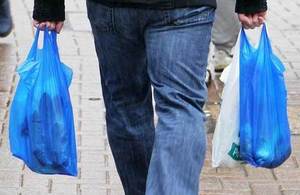Plastic bag numbers rise for the fifth year
British shoppers took 8.5 billion single-use carrier bags from major supermarkets in 2014.

Find out more about what the carrier bag charge means for consumers and retailers.
The number of plastic bags taken from supermarkets has increased for the fifth year running – despite research from the Department for Environment, Food and Rural Affairs showing that the average household already has 40 plastic bags stashed away around the home.
New figures released today show British shoppers took 8.5 billion single-use carrier bags from major supermarkets in 2014 – up two hundred million from 2013.
Plastic bags can take years to fully decompose and even though household recycling rates have improved significantly in recent years, 16,000 tonnes of waste still goes to landfill every year. Around 8 million tonnes of plastic also ends up in our oceans each year, polluting our marine environment and harming our precious sea life.
Commenting on the research, Resource Minister Rory Stewart said:
We’re all guilty of taking a carrier bag from a supermarket, storing it somewhere safe at home with the intention of using it again, then forgetting to take it with us next time we go to the shops. But the more bags we take, the more plastic makes its way into our environment, blighting our high streets, spoiling our enjoyment of the countryside, and damaging our wildlife and marine environments.
Simple changes to our shopping routines, such as taking our own bags with us or using more bags for life, can make a huge difference in reducing the amount of plastic in circulation meaning we can all enjoy a cleaner, healthier country.
The latest figures on plastic bag usage come ahead of the introduction of the 5p charge for single-use plastic carrier bags, which comes into effect in England in October following the success of similar schemes in Scotland and Wales. In Wales the charge led to an 79% decrease in plastic bags taken in the first three years and in Scotland the number of ‘bags for life’ used quadrupled last year.
By comparison, in England ‘bags for life’ only account for one in 20 bags taken from major retailers. This new charge will directly address the number of plastic carrier bags distributed by large supermarkets and small businesses are invited to introduce a charge on a voluntary basis.
Rory Stewart added:
Countries with the 5p charge have seen a dramatic fall in the number of plastic bags taken from supermarkets and we can expect a significant reduction in England, possibly by as much as 80% in supermarkets and 50% on the high street.
The charge will also boost our growing economy by delivering savings of £60 million in litter clean-up costs and £13 million in carbon savings.
Good causes will also benefit from the charge, and as much as £730 million could be donated to charities and not-for-profit organisations over 10 years.
Further information
Read more information for consumers and retailers about the 5p charge for single-use plastic carrier bags, or see the new research on carrier bag use.
Watch our short video for consumers and others explaining the 5p charge for single-use plastic carrier bags:
Single-use plastic carrier bag charge
Transcript of commentary on video:
From 5 October 2015, large shops in England will have to charge five pence for all single use plastic carrier bags they provide. In 2013, the major supermarkets in England gave out over 7.4 billion plastic bags – that’s 133 bags for every person. To protect our environment from litter and pollution we are committed to bringing this number down.
The five pence charge on single use plastic carrier bags could reduce usage by as much as 80% in the big supermarkets. Small retailers don’t have to charge but can do so on a voluntary basis. You can avoid paying the charge either by reusing single use plastic carrier bags, or by using multi-use bags for life. You also won’t pay a five pence charge if you’re using a paper bag, if you’re in transit, or if your bag only contains certain items, such as unwrapped food, raw meat and fish, prescription medicines, uncovered blades, seeds, bulbs and flowers, or live fish.
Retailers need to keep track of how many plastic bags they’ve given out and where the proceeds have gone … and report this to Government by 31 May every year. We expect good causes to benefit from the charge by tens of millions of pounds each year.
Last updated 24 July 2015 + show all updates
-
Added links for research, and guidance for retailers and consumers.
-
First published.